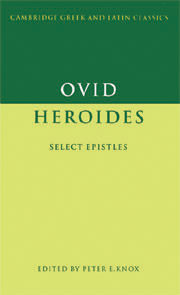Commentary
Published online by Cambridge University Press: 12 October 2018
Summary
Penelope Vlixi
The first of the Heroides serves as an introduction to the entire collection, illustrating by example both the major themes of the following epistles and the manner of treatment. Its primary reference is to a single literary model, Homer's Odyssey, and O.'s selection of Homeric epic for eroticized treatment in the introductory elegy should be regarded as an implied Statement of his own literary principles. O.'s epistle is the earliest surviving example of a trend towards romanticizing the story of Ulysses’ return to Penelope (Stanford (1963) 143); but he was surely not the first poet in antiquity to read the Odyssey as a love story, as he himself characterized it several years later in a defence of his poetry to Augustus: Trist. 2.375-6 aut quid Odyssea est nisifemina propter amorem, \ dum uir abest, multis una petita procis? Poets for centuries had treated Penelope as an exemplum pudicitiae (RE xix 483-4), but there are traces of a reaction against this tendency in Horace's Suggestion of an erotic treatment of the Odyssey as a subject for a music girl in an invitation to a Symposium: Hör. Carm. 1.17.17-20 hie in redueta ualle Caniculae \ uitabis aestus etfide Teia \ dices laborantes in uno \ Penelopen uitreamque Circen. Prose summaries by the Greek poet Parthenius of two stories of the amorous escapades of Odysseus with Polymele (Erot. 2) and Euippe (Erot. 3) offer further evidence of an inclination by Hellenistic Greek writers to focus upon the erotic conquests of the Homeric hero. An interesting twist is provided later by Lucian, who produces the text of an epistle from Odysseus to Galypso (Ver. hist. 2.35) expressing regret for his decision to leave her for Penelope. Our evidence for the role of Penelope in post-Homeric aecounts of the story is scanty (Jacobson (1974) 245- 6), but it seems clear that it was O. who took the imaginative step of representing the events of the Odyssey from her point of view. In so doing, he has taken her character far beyond the traditional role of a paradigm of fidelity.
- Type
- Chapter
- Information
- Ovid: Heroides , pp. 86 - 315Publisher: Cambridge University PressPrint publication year: 1996



